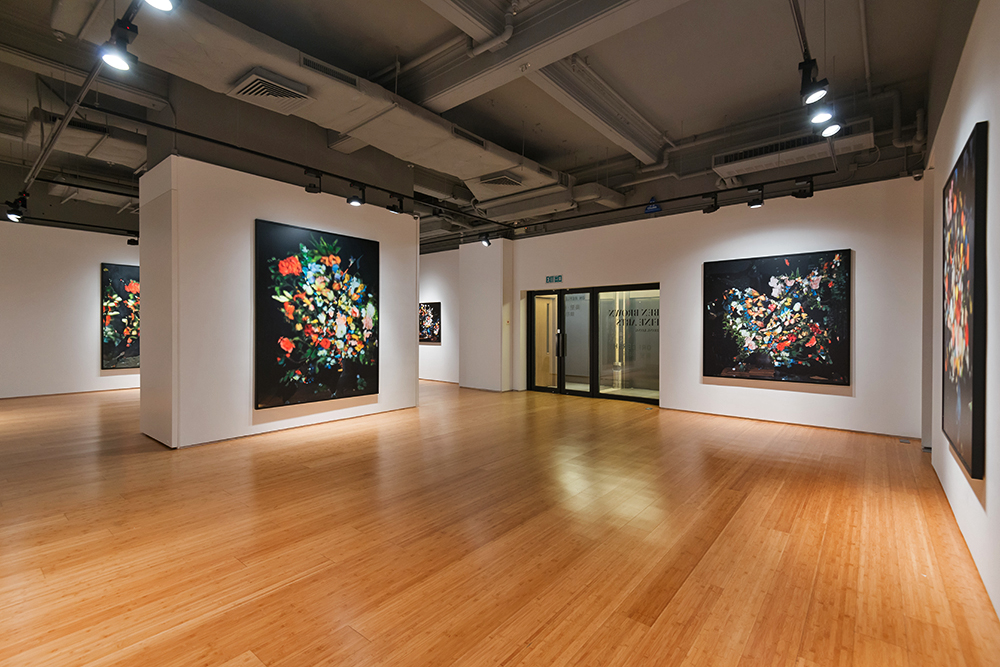Shows
Ori Gersht’s “On Reflection”


The concept of Ori Gersht’s current exhibition, “On Reflection,” snakes through centuries, drawing on influences from the Dutch Golden Age and Flemish Baroque paintings of the 17th century to capture a meticulously staged, yet aleatoric moment of chaos. In a display of 11 works, ranging in media from photographs to video, Gersht’s first solo show in Hong Kong, held at Ben Brown Fine Arts, charts the movement of destruction. Here, the artist captures subliminal moments that hang between the metaphysical and real—fragments of time that would have been entirely inconceivable to the Old Masters.
Born in Tel Aviv in 1967—three months prior to the Six-Day War of Israel against Syria, Jordan and Egypt—Gersht’s artistic allusions in his photo and film series “On Reflection” (2014) are expressly keyed to the events of his life. Having personally encountering three additional civil wars (the Yom Kippur War in 1973, the 1982 Lebanon War and the First Intifada in 1987), Gersht's artworks mirror the beauty, as well as the political violence, of our world. Such notions are explicitly hinted in the five-minute-long, three-channel video installation On Reflection (2014).
In a 2009 interview with Smithsonian magazine about the inspiration behind his works, Gersht explains how he is fascinated by the “parallel existence” between “scenarios where, in one place, there is a very bloody war, while in another place people are living a comfortable, decadent lifestyle.” He makes this a poignant point in his video works, emphasizing that remote events can sometimes trickle down into our own pleasant, parochial worlds.

Haunting and surreal, each of the three, silk flower arrangements—exact replicas of Flemish painter Jan Brueghel the Elder’s 17th century masterpieces—in On Reflection are propped against a stark, black background, which accentuate their palette. There is no movement; the leaden air remains still. The camera is completely absorbed by the tranquillity of the scene, urging viewers to contemplate the superb, floral creations. Without warning, a glass mirror suddenly shatters the harmony in slow-motion, with each nanosecond of a frame splitting time into individual atoms of chaos. Illusion trembles violently on the edge of duplicity, as it becomes immediately clear to viewers that, all along, the flowers on the screen were merely a reflection in a mirror.

Unlike his earlier video works, there is no forewarning that builds up to the climactic moment in On Reflection. The perfectly brutal explosion completes the sequence, sending glass shards showering down, with the jewel-like fractals reflecting the flowers in the background. To make this happen, electrical charges were delivered to the mirrors—and large-format digital cameras were focused on various parts of the three, elaborately arranged bouquets—revealing that even through the delineations of photography, the notion of an objective truth can be a fallible idea. In the video, following the explosion, the multiple high-speed cameras continue recording the split-second action with precise detail, as though examining how deceptive representations of reality can be.
In the adjacent exhibition rooms, viewers are faced with ten enlarged video stills from the film presented as archival pigment prints. The images somewhat reverse the symbolic value of still-life paintings, or the idea that they are meant to immortalize the experience of nature. Frozen in time, images of the explosion also plays on the notion of memento mori and the transient nature of life. Thanatotic undertones are also seen in the fine network of cracks in the mirrors, which are especially noticeable in On Reflection, Material E01 and On Reflection, Material B02 (both 2014). Gersht’s works provide a glimpse into the terrain of the unseen, or what German philosopher and cultural critic Walter Benjamin coined the “optical unconsciousness.” The outcome is a powerful reminder of the fragility of existence.
“On Reflection” is on view at Ben Brown Fine Arts, Hong Kong, until July 11, 2015.







